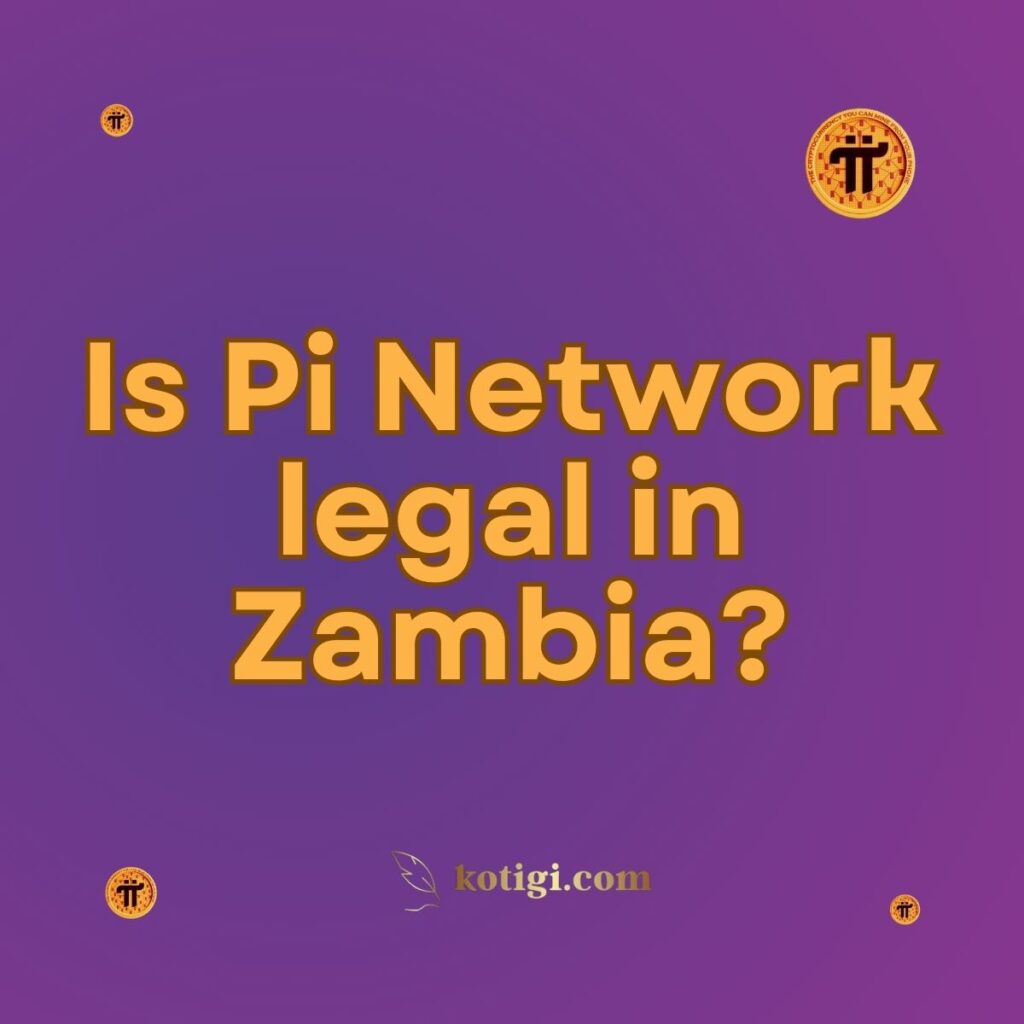
Is Pi Network legal in Zambia?
Yes, Pi Network is legal in Zambia. Currently, there are no specific laws or regulations banning Pi Network, but users should be mindful of Zambia’s regulatory stance on cryptocurrencies and follow updates from local authorities regarding digital currencies.
Introduction
Pi Network, a rapidly growing cryptocurrency that enables users to mine Pi tokens on their mobile devices, has gained significant traction worldwide, including in African countries like Zambia. As Pi continues to gain popularity, it’s essential for potential users in Zambia to understand its legal status, the country’s regulatory environment concerning cryptocurrencies, and the general outlook on digital assets within the nation.
In this article, we explore the legal standing of Pi Network in Zambia, discuss the country’s approach to cryptocurrency regulation, and offer insights into what Zambian users need to consider when engaging with Pi Network.
Zambia’s Regulatory Environment for Cryptocurrencies
Current Legal Framework
As of now, Zambia does not have a comprehensive regulatory framework that governs the use of cryptocurrencies. The country has shown caution towards digital currencies, largely due to concerns around financial security and potential risks related to money laundering. Despite these concerns, there is no outright ban on the use of cryptocurrencies such as Pi Network for personal transactions or participation in decentralized networks.
Bank of Zambia’s Position on Cryptocurrencies
The Bank of Zambia (BoZ), the country’s central financial authority, has issued public statements warning citizens about the risks associated with cryptocurrencies. BoZ emphasized that digital currencies are not legal tender in Zambia, meaning they are not officially recognized as a form of currency for payments. However, the bank has not prohibited individuals from holding or using cryptocurrencies like Pi.
Potential Regulatory Developments
Although Zambia currently lacks specific cryptocurrency legislation, the government has been monitoring the global trends surrounding digital assets. In the future, it’s possible that Zambia may implement laws to regulate cryptocurrencies and ensure that they align with the country’s financial and economic policies. Zambian users of Pi Network should remain informed about potential regulatory changes to stay compliant.
Pi Network’s Legal Status in Zambia
Is Pi Network Legal in Zambia?
Yes, Pi Network is legal in Zambia. Since there are no explicit laws or bans targeting the use of cryptocurrencies, Zambian residents are free to mine and use Pi tokens without violating any specific legal provisions. However, as with any financial technology, users should approach cryptocurrency with caution and ensure that they remain updated on any new regulations that may emerge.
KYC and Compliance
Pi Network requires users to complete a Know Your Customer (KYC) verification process to ensure the legitimacy of participants. This aligns with many global anti-money laundering (AML) and combating the financing of terrorism (CFT) standards, which could help Pi Network comply with future regulatory frameworks that Zambia might establish.
Risks and Considerations for Pi Network Users in Zambia
Cryptocurrencies and Financial Risks
The Bank of Zambia has warned citizens about the inherent risks of investing in or using cryptocurrencies. Like other digital currencies, Pi tokens could experience high volatility, meaning their value can fluctuate significantly over time. Users should be aware that, unlike fiat currencies, Pi tokens are not protected or insured by any financial institutions in Zambia.
Legal Uncertainty
While Pi Network is currently legal, Zambia’s regulatory environment around cryptocurrencies is still evolving. Future regulations could introduce new requirements or restrictions on cryptocurrency use. Zambian users should keep an eye on developments in cryptocurrency regulation to ensure that they remain compliant and avoid any potential legal challenges.
Financial Transactions and Fiat Conversion
Though users in Zambia can freely mine and use Pi Network, converting Pi tokens to local fiat currency (the Zambian kwacha) may present challenges if stricter regulations are introduced. Currently, cryptocurrencies like Bitcoin face restrictions on how they can be used for payment or financial transactions in Zambia. This may affect the liquidity and usability of Pi tokens in the Zambian market.
Tax Implications for Pi Network Users in Zambia
Cryptocurrency Taxation
At present, Zambia does not have specific tax regulations for cryptocurrencies like Pi. However, as the use of digital currencies grows, tax authorities may begin to impose taxes on cryptocurrency income or transactions. Zambian users who mine Pi should keep accurate records of their holdings and activities in case such tax regulations are introduced.
Future Tax Obligations
Given the lack of clarity around cryptocurrency taxation in Zambia, users should be prepared for potential future tax obligations. If the Zambian Revenue Authority (ZRA) introduces taxation on cryptocurrency income or gains, Pi Network users will need to ensure they report and pay taxes accordingly.
Zambia’s Relationship with Blockchain and Cryptocurrencies
Potential for Blockchain Adoption
Although Zambia has not fully embraced cryptocurrencies, the country has shown some interest in blockchain technology, which underpins digital currencies like Pi. Blockchain has the potential to improve transparency and efficiency in various sectors, including finance, supply chains, and governance. As Zambia explores blockchain technology, the country could develop a more favorable environment for decentralized networks like Pi Network.
Cross-Border Cryptocurrency Regulations
Zambian users should be cautious when engaging in cross-border cryptocurrency transactions, as international regulations vary widely. While Pi Network is legal in Zambia, international transfers or exchanges involving other jurisdictions could trigger compliance issues, especially in countries with stricter cryptocurrency regulations.
Conclusion
Pi Network is legal in Zambia, and there are currently no laws prohibiting its use. The country’s regulatory framework around cryptocurrencies is still developing, and although the Bank of Zambia has issued warnings about the risks associated with digital currencies, it has not imposed an outright ban. Users in Zambia should be aware of the legal uncertainties surrounding cryptocurrencies and stay informed about any potential regulatory changes.
As Pi Network continues to grow, users in Zambia should exercise caution when using the platform and ensure they comply with any applicable laws and future regulations. Keeping records of transactions and monitoring the legal landscape will help Zambian Pi users participate responsibly in this emerging digital economy.
Key Takeaways
- Legality: Pi Network is currently legal in Zambia, with no specific laws banning its use.
- Regulatory Stance: The Bank of Zambia has issued warnings about cryptocurrencies but has not prohibited their use.
- Potential Regulation: Zambia may introduce cryptocurrency regulations in the future, so users should stay informed.
- Tax Considerations: Cryptocurrency taxation is not yet in place, but users should be prepared for potential tax obligations.
- Blockchain Adoption: Zambia is exploring blockchain technology, which could create a favorable environment for decentralized networks like Pi Network.





